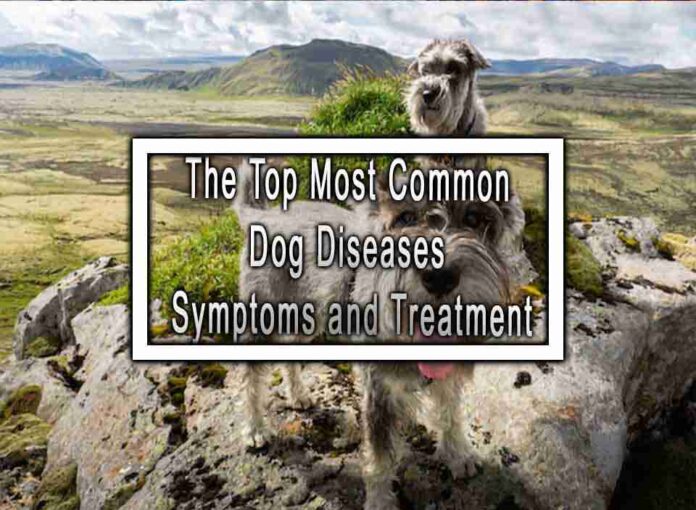Dogs can be susceptible to various diseases, and it’s important for dog owners to be aware of the most common dog diseases, their symptoms, and available treatments. Here are some of the top most common dog diseases, along with their symptoms and treatment options:

1. Canine Parvovirus (Parvo)
– Symptoms: Severe vomiting, diarrhea (often bloody), loss of appetite, lethargy, dehydration.
– Treatment: Hospitalization, intravenous fluid therapy, medication to control vomiting and diarrhea, antibiotics to prevent secondary infections.
2. Canine Distemper
– Symptoms: Fever, coughing, nasal discharge, loss of appetite, lethargy, neurological signs (tremors, seizures), eye discharge.
– Treatment: Supportive care, symptomatic treatment, antibiotics to prevent secondary infections, anticonvulsant medication if seizures occur.
3. Canine Infectious Respiratory Disease (Kennel Cough)
– Symptoms: Persistent cough, honking sound, nasal discharge, sneezing, mild fever, loss of appetite.
– Treatment: Rest, isolation from other dogs, humidified air, cough suppressants, antibiotics if a bacterial infection is present.
4. Canine Lyme Disease
– Symptoms: Fever, lameness, joint swelling, loss of appetite, fatigue, enlarged lymph nodes.
– Treatment: Antibiotics (usually a course of 4 weeks or longer), pain management, supportive care.
5. Canine Leptospirosis
– Symptoms: Fever, vomiting, diarrhea, muscle pain, lethargy, jaundice, increased thirst and urination.
– Treatment: Antibiotics, intravenous fluid therapy, supportive care, prevention through vaccination.
6. Canine Heartworm Disease
– Symptoms: Cough, difficulty breathing, exercise intolerance, weight loss, lethargy, enlarged abdomen.
– Treatment: Medication to kill adult heartworms, strict exercise restriction, preventive medication for future protection.
7. Canine Rabies
– Symptoms: Changes in behavior, aggression, excessive salivation, difficulty swallowing, paralysis, seizures.
– Treatment: No cure for rabies once symptoms appear. Prevention through vaccination is crucial. If exposed to a rabid animal, immediate medical attention is necessary.
8. Canine Canine Pancreatitis
– Symptoms: Loss of appetite, vomiting, abdominal pain, diarrhea, dehydration, lethargy, fever.
– Treatment: Fasting, intravenous fluid therapy, medication to control pain and inflammation, low-fat diet.
9. Canine Allergies
– Symptoms: Itching, scratching, redness, skin irritation, hair loss, ear infections.
– Treatment: Identification and avoidance of allergens, medicated shampoos, antihistamines, immunotherapy, topical treatments, dietary changes.
10. Canine Dental Disease
– Symptoms: Bad breath, inflamed gums, tartar buildup, loose or missing teeth, difficulty eating.
– Treatment: Professional dental cleaning under anesthesia, home dental care (brushing, dental chews), regular check-ups.
It’s important to note that this is not an exhaustive list, and there are many other diseases that can affect dogs. If you notice any concerning symptoms in your dog, it’s always best to consult with a veterinarian for an accurate diagnosis and appropriate treatment. Regular veterinary check-ups, vaccinations, and preventive measures can help keep your dog healthy and reduce the risk of diseases.











